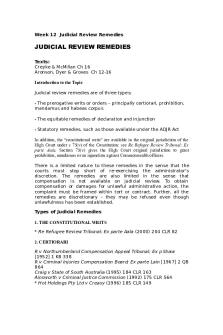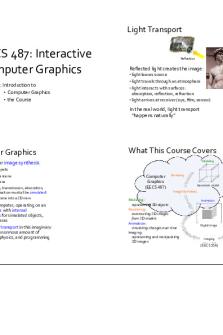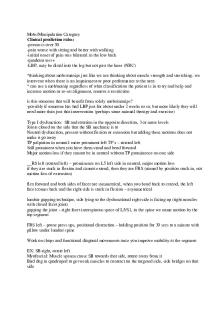Article-1156-1162 - lecture PDF

| Title | Article-1156-1162 - lecture |
|---|---|
| Author | Trxsh Batu |
| Course | Busines Law (Obligations & Contracts) |
| Institution | University of the East (Philippines) |
| Pages | 4 |
| File Size | 133.4 KB |
| File Type | |
| Total Downloads | 247 |
| Total Views | 434 |
Summary
Art. 1156. An obligation is a judicial necessity to give, to do, or not to do.What is an obligation? It is from the Latin word obligatio which means tying or binding. “Judicial necessity”, defined. Obligation is a judicial necessity (to give, to do, or not to do) because failure or refusal to perfor...
Description
ARTICLE 1156 – 1162 Art. 1156. An obligation is a judicial necessity to give, to do, or not to do.
What is an obligation? -
It is from the Latin word obligatio which means tying or binding.
“Judicial necessity”, defined. -
Obligation is a judicial necessity (to give, to do, or not to do) because failure or refusal to perform the obligation gives rise to a right of action. Nature of Obligations Under the Civil Code
Civil Obligations -
Obligations that give to the creditor or obligee a right under the law to enforce their performance in courts of justice.
Natural Obligations -
Obligations that do not grant a right of action to enforce their performance although incase of voluntary fulfillment by the debtor, the latter may not recover what has been delivered or rendered by reason thereof. Essential Requisites of an Obligation
1. 2. 3. 4.
Passive Subject (debtor or obligor) Active Subject (creditor or obligee) Object or Prestation (subject matter of the obligation) Juridical or Legal Tie (Efficient Cause)
Example: C and D entered into a loan contract whereby D promised to pay his P100,000 debt to C within one year. C is the active subject. D is the passive subject. The P100,000 loan is the object or prestation, and the agreement or contract is the juridical or legal tie, which is also the source of the obligation. Obligation vs. Right vs. Wrong Obligation is the act or performance that the law will enforce. Right is the power that a person has under the law, to demand from another any prestation. Wrong (cause of action) is an act or omission in violation of the legal right or rights of another.
ARTICLE 1156 – 1162 Kinds of Obligations According to Subject Matter 1. Real Obligation (obligation to give) – the subject matter is a thing that the obligor must deliver to the obligee. Two Kinds of Real Obligation 1) Generic Real Obligation (GRO) – to give a generic or indeterminate object. 2) Specific Real Obligation (SRO) – to give a specific or determinate object. 2. Personal Obligation (obligation to do or not to do) – the subject matter is an act to be done or not be done. Two Kinds of Personal Obligation 1) Positive Personal Obligation – obligation to do or to render service. 2) Negative Personal Obligation – obligation not to do. Sources of Obligations Art. 1157: 1) Law; - obligations imposed by law itself. Example: Obligation to pay taxes 2) Contracts; - obligations arising from the stipulations of the parties (Art. 1306) Example: The obligation of the client to pay the professional fee of his/her accountant by virtue of a service agreement. 3) Quasi-contracts; - obligations arising from lawful, voluntary, and unilateral acts that are enforceable so that no person shall be unjustly enriched or benefited at the expense of another (Art. 2142) Example: The obligation to return the goods mistakenly delivered. 4) (Crimes or) Acts or omissions punished by law; and – obligations arising from civil liability as a consequence of a criminal offense (Art. 1161) Examples: The obligation of a government employee to return the money stolen from the government. The obligation of a convicted criminal to pay the medical expenses incurred by the victim of his assault. 5) Quasi-delicts (or torts) – obligations arising from damaged caused to another through an act or omission, there being fault or negligence, but no contractual relation exist between the parties (Art. 2176) Example: The proprietor of a building or structure is responsible for the damages resulting from its total or partial collapse, if it should be due to the lack of necessary repairs (Art. 2190)
ARTICLE 1156 – 1162 Art. 1158 – Obligations derived from law Legal Obligations Obligations derived from law are not presumed. Only those expressly determined in the Civil Code or in special laws are demandable. Special laws are those not contained in the Civil Code. Examples: Revised Penal Code, National Internal Revenue Code, Securities Regulation Code, Revised Corporation Code, Negotiable Instruments Law, Insurance Code, Labor Code A private school has no legal obligation to provide clothing allowance to its teachers because there is no law which imposes this obligation upon schools. But a person who wins money in gambling has the duty to return his winnings to the loser. This obligation is provided by law
Art. 1159 – Obligations arising from the contracts Contractual Obligations Contract – a meeting of minds between two persons whereby one binds himself with respect to the other to give something or to render some service (Art. 1305) Binding force of a contract Obligations arising from contracts have the force of law between the contracting parties and should be complied with in good faith. As a source of enforceable obligation, a contract must be valid and it cannot be valid if it is against the law. Compliance in Good Faith Compliance or performance of an obligation strictly in accordance with the stipulations of terms or conditions as provided in the contract or agreement. Example: If A agrees to sell and deliver 1000 face shields to B and B agrees to pay for them P40,000, then both of A and B are bound by the terms of their contract. Neither of them may, voluntarily, and without any reason, withdraw from the contract or escape from his/her obligations thereunder. The terms and conditions of their contract is the law between A and B and they must comply in good faith. Art.1160 – Obligations arising from quasi-contracts Kinds of Quasi-contracts 1. Negotiorum gestio – the voluntary management of the property or affairs of another without the knowledge or consent of the latter. (Art. 2144) 2. Solutio indebiti – the juridical relation which is created when something is received when there is no right to demand it and it was unduly delivered through mistake (Art. 2154) The requisites are:
ARTICLE 1156 – 1162 a. There is no right to receive the thing delivered; and b. The right thing was delivered through mistake. Art. 1161 – Obligations arising from crimes The rule is a person who is criminally liable is also civilly liable. Scope of Civil Liability arising from crime: 1. Restitution 2. Reparation for damaged caused 3. Indemnification for the consequential damages Example: A stole B’s cellphone. If A is convicted, his civil liability will include: 1. The obligation to return the phone or pay its value if it was lost or destroyed; 2. Pay for any damaged caused to the phone; and 3. Pay such other damages B may have suffered as a consequence of A’s crime Art. 1162 – Obligations arising from quasi-delict Requisites of Quasi-delict: 1. 2. 3. 4.
There must be an act or omission; There must be fault or negligence; There must be damaged caused; There must be a direct relation or connection of cause and effect between the act or omission and the damage; and 5. There is no pre-existing contractual relation between the parties. Crime Distinguished from Quasi-delict Crime There is malice or intent. Purpose is to punish the offender. Offender is criminally and civilly liable. Only the civil aspect of the crime may be compromised. Offender’s guilt must be proved beyond reasonable doubt.
Quasi-delict There is only negligence, imprudence, lack of foresight or lack of skill. Purpose is to compensate the offended party for the damages sustained. Offender is civilly liable only. The civil liability can be compromised. Defendant’s liability needs only be proved by preponderance of evidence....
Similar Free PDFs

Lecture notes, lecture 3
- 5 Pages

Lecture notes, lecture Subspaces
- 21 Pages

Lecture notes, lecture 14
- 3 Pages

Lecture notes, lecture 6
- 3 Pages

Lecture notes, lecture 7b
- 4 Pages

Lecture notes, lecture 13
- 12 Pages

Lecture notes, lecture 12
- 9 Pages

Lecture notes, lecture all
- 62 Pages

Lecture notes, lecture 25
- 44 Pages

Lecture notes, lecture All
- 273 Pages

Lecture notes, lecture 1
- 9 Pages

Lecture notes, lecture 7
- 22 Pages

Lecture notes, lecture 1
- 4 Pages

MAPA CG - Lecture Lecture
- 5 Pages
Popular Institutions
- Tinajero National High School - Annex
- Politeknik Caltex Riau
- Yokohama City University
- SGT University
- University of Al-Qadisiyah
- Divine Word College of Vigan
- Techniek College Rotterdam
- Universidade de Santiago
- Universiti Teknologi MARA Cawangan Johor Kampus Pasir Gudang
- Poltekkes Kemenkes Yogyakarta
- Baguio City National High School
- Colegio san marcos
- preparatoria uno
- Centro de Bachillerato Tecnológico Industrial y de Servicios No. 107
- Dalian Maritime University
- Quang Trung Secondary School
- Colegio Tecnológico en Informática
- Corporación Regional de Educación Superior
- Grupo CEDVA
- Dar Al Uloom University
- Centro de Estudios Preuniversitarios de la Universidad Nacional de Ingeniería
- 上智大学
- Aakash International School, Nuna Majara
- San Felipe Neri Catholic School
- Kang Chiao International School - New Taipei City
- Misamis Occidental National High School
- Institución Educativa Escuela Normal Juan Ladrilleros
- Kolehiyo ng Pantukan
- Batanes State College
- Instituto Continental
- Sekolah Menengah Kejuruan Kesehatan Kaltara (Tarakan)
- Colegio de La Inmaculada Concepcion - Cebu

